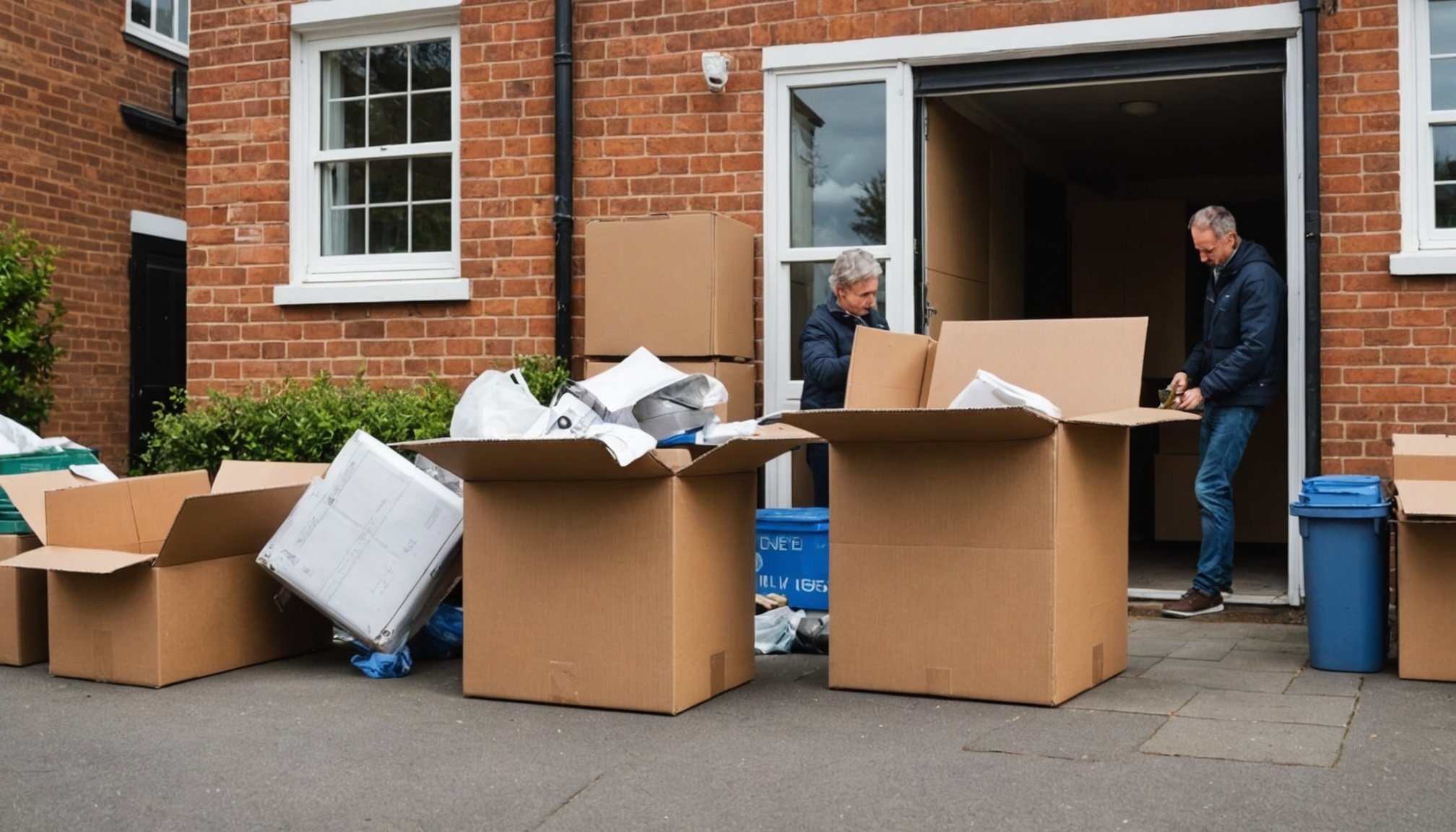Overview of Unwanted Item Disposal Before Moving
Before relocating, engaging in responsible disposal of unwanted items is essential for multiple reasons. Not only does it promote environmental sustainability, but it also adheres to local legal requirements. It is imperative to understand the guidelines regarding the disposal of various materials, which may vary by location, and to ensure compliance with these laws.
Decluttering before moving can significantly simplify the relocation process. By reducing the amount of items you need to transport, moving becomes more efficient and cost-effective. This step is also beneficial for mental clarity, as a decluttered space often leads to a more organized mindset.
In the same genre : Smart and Sustainable: Eco-Friendly Ways to Dispose of Old Electronics Before Your Move in the UK
Responsible disposal entails a thoughtful approach to getting rid of items, considering both legal obligations and environmental impact. Different methods like donating, recycling, and safe disposal must be used depending on the item’s condition and category. This not only helps in maintaining sustainability but also in supporting charitable causes when donation is involved. Being aware of environmental considerations and the impact of waste is crucial, informing your decisions about which disposal methods to employ during your move.
Sorting Your Items for Disposal
Embarking on the sorting process can seem daunting, but a step-by-step approach simplifies this task. Start by categorizing your belongings into four essential groups: keep, donate, recycle, and dispose. This system not only aids in decision-making but ensures every item finds its rightful place, whether it’s a new owner or a recycling facility.
In the same genre : Essential Guide to Notifying Neighbors About Your Move in a UK Community
Begin with one room, methodically working through each area. Assess whether each item is necessary, offering genuine value or joy, which aids in identifying what should be kept. Clothing, in particular, can be targeted for donation if it’s in good condition but no longer worn.
The next step involves setting aside items for donation. Many charities urgently need quality clothing, books, and household items. Items beyond reuse are earmarked for recycling, ensuring environmentally sound disposal for materials like electronics and certain plastics.
Finally, efficiently tackle the sorting process by using containers labeled for each category. This visual aid helps maintain order and minimizes confusion as your task progresses. By following these strategies, decluttering becomes less overwhelming, preparing you for a smoother move.
Donation Options in the UK
Exploring donation options provides an excellent opportunity to support local communities while responsibly parting with unwanted items. The UK boasts a myriad of charities that eagerly accept donations, from clothing and books to household items.
Local Charities
Local charities such as Oxfam, British Heart Foundation, and Shelter are prominent and provide vital services. When selecting items, ensure they are in good condition—wearable clothing, books without damage, and home goods functioning correctly. Coordinating donation logistics can often be streamlined, as many charities offer scheduled pick-ups for larger donations. Otherwise, dropping off items at designated charity shops is straightforward and efficient.
Online Platforms
Harnessing online platforms offers an additional avenue for decluttering. Platforms such as Freecycle and Gumtree enable the local community to reuse items directly. While engaging in online transactions, it is crucial to adhere to safety tips, such as meeting in public places and avoiding sharing personal information. To maximize the reach of your donation efforts, craft clear, descriptive listings that highlight the items’ condition and benefits. By leveraging both local charities and digital outlets, you can ensure your unwanted items find new homes, promoting a cycle of giving and reuse.
Recycling and Waste Disposal Regulations
Understanding recycling and waste disposal regulations in the UK is paramount when moving. Each area imposes specific guidelines to manage waste, which not only protect the environment but are legally binding. It’s essential to familiarise yourself with these rules before discarding items during a move.
The UK’s recycling policies encourage separating waste by material—glass, plastic, paper, and metal—making recycling easier and more effective. There’s a strict focus on reducing landfill contributions and promoting reuse. Local authorities often provide detailed instructions on website or pamphlet regarding what can be recycled and acceptable item conditions.
Each locality may differ in its regulations for handling bulky waste, electronics, or hazardous materials like batteries. Some councils offer special collections for complex disposals, while others might require you to visit designated centres. Always consult local regulations for a comprehensive understanding of your responsibilities and options.
For accurate guidance on relevant waste disposal practices, you can access resources such as the UK Government’s recycling pages or community information centres. These resources empower movers to act responsibly, ensuring their relocation journey is eco-friendly and compliant with UK law.
Finding Local Recycling Centers
Identifying local recycling centers is essential for efficient waste management during a move. These centers facilitate the proper disposal of various materials, contributing to environmental sustainability. To locate them, start by contacting your local council or searching community websites that provide comprehensive listings of nearby facilities.
Most recycling centers accept a wide range of materials, including glass, plastic, paper, and metals. Electronics and hazardous waste require specific handling, both of which might be accommodated through specialized services at certain centers. Before heading out, verify the types of materials accepted, as these can vary significantly by region.
When preparing items for recycling, ensure they’re clean and free from non-recyclable attachments. For instance, rinse out containers and remove staples from paper. Proper preparation is key to maintaining the efficiency of the recycling process and supporting a green environment.
Leveraging community resources, you can access comprehensive guidelines on recycling practices, facilitating responsible disposal. By engaging with local recycling centers, you contribute to a circular economy, benefiting both the community and the environment.
Tips for Minimizing Waste During the Move
Moving can generate a significant amount of waste, but adopting waste reduction strategies helps maintain efficiency. Start by embracing minimalism, evaluating possessions critically. This not only lightens your load but reduces potential waste. Assess each item’s value, and resist the urge to pack everything—focus on essentials.
When packing, utilise sustainable materials. Cardboard boxes, reusable containers, and biodegradable packing peanuts are preferable. These materials reduce waste and are environmentally friendly. Consider packing fragile items with soft textiles like towels instead of bubble wrap, further minimising unnecessary waste.
After the move, implement practices to manage waste sustainably. Break down and recycle all packing materials immediately. If you have reusable items that you no longer need, either donate them or find a recycling program that accepts such items. Reducing your overall output ensures you don’t clutter your new space with refuse.
Prioritising minimalist principles keeps clutter at bay. Moreover, integrating such methods provides mental clarity and enhances moving efficiency, aligning with a sustainable lifestyle. Adopting these practices benefits both you and the environment, supporting a seamless transition to your new home.
Environmentally Friendly Disposal Options
Employing eco-friendly disposal methods is essential for preserving our environment while responding to personal and legal obligations. Choosing sustainable practices supports environmental health by minimising pollution and conserving natural resources.
There are several viable environmentally friendly disposal methods. Donating items in good condition extends their lifecycle and benefits local communities. Additionally, recycling transforms waste materials into reusable resources, effectively reducing landfill burdens. For organic waste, composting serves as a natural recycling process, enriching soil health.
The benefits of selecting sustainable disposal options are numerous. They include reducing your carbon footprint, decreasing pollution levels, and conserving energy. These methods also align with ethical standards, supporting global efforts toward sustainability and responsibility.
For guidance on responsible disposal practices, various resources can assist in implementing sustainable practices. Local councils often provide information on collection services and recycling facilities. Additionally, environmental organisations offer advice on reducing and reusing waste effectively. By integrating these practices into your moving routine, you contribute significantly to environmental sustainability while also complying with necessary regulations.











